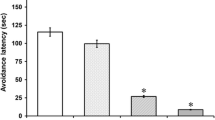Abstract
The endogenous opiate peptide, beta-endorphin (0.4, 1.0, 2.0, and 10.0 μg/kg) was injected IP into rats immediately after training in a shuttle avoidance task, and its effect on memory retention was evaluated in test sessions carried out 24 h later. The drug was found to cause retrograde amnesia, the ED50 being 1.0 μg/kg. Beta-endorphin immunoreactivity was measured in the hypothalamus and rest of the brain of rats submitted to training, or test sessions of shuttle avoidance learning, pseudoconditioning in the shuttle-box, tones alone, or foot-shocks alone. After training in any of the four paradigms, there was a marked (46–60%) depletion of beta-endorphin immunoreactivity in the rest of the brain. No changes were detected in the hypothalamus or after test sessions. The loss of beta-endorphin immunoreactivity may be attributed to release of this substance caused by the stimuli used for training. From the present findings, as well as previous observations on the memory-facilitating influence of the opiate receptor antagonist, naloxone, it is concluded that there is a physiological amnesic mechanism mediated by beta-endorphin (and perhaps other opoid peptides as well), which is triggered by the non-associative factors present in the various forms of learning.
Similar content being viewed by others
References
Beaumont A, Hughes J (1979) Biology of opioid peptides. Annu Rev Pharmacol Toxicol 19:345–267
Bliss CI (1967) Statistics in biology, vol I. McGraw-Hill, New York
Bloom FE, Rossier J, Battenberg ELF, Bayon A, French E, Henriksen SJ, Siggins GR, Segal D, Browne R, Ling N, Guillemin R (1978) β-Endorphin: Cellular localization, electrophysiological and behavioral effects. In: Costa E, Trabucchi M (eds) The endorphins. Raven, New York (Advances in Biochemical Pharmacology, vol 18), p 89
DeWied D, Bohus B, van Ree, JM, Urban I (1978) Behavioral and electrophysiological effects of peptides related to lipotropin (β-LPH). J Pharmacol Exp Ther 204:570–580
Dias RD, Carrasco MA, Souza DO, Izquierdo I (1979) Effect of naloxone, haloperidol, and propranolol on cyclic 3′,5′-adenosine monophosphate content of rat amygdala. Eur J Pharmacol 60:345–347
Gold PE, McGaugh JL (1975) A single-trace, two-process view of memory storage processes. In: Deutsch D, Deutsch JA (eds) Short-term memory. Academic Press, New York, pp 355
Gros C, Pradelles P, Rouget C, Bepoldin O, Dray F, Fournie-Zaluski MC, Roques BP, Pollard H, Llorens-Cortes C, Schwartz JC (1978) Radioimmunoassay of methionine- and leucine-enkephalins in regions of rat brain and comparison with endorphins estimated by a radioreceptor assay. J Neurochem 31:29–39
Izquierdo I (1979) Effect of naloxone and morphine on various forms of memory in the rat: possible role of endogenous opiates in memory consolidation. Psychopharmacology 66:199–203
Izquierdo I (1980) Effect of beta-endorphin and naloxone on acquisition, memory and retrieval of shuttle avoidance and habituation learning in rats. Psychopharmacology 69:111–115
Izquierdo I, Elisabetsky E (1979) Physiological and pharmacological dissection of the main factors in the acquisition and retention of rat shuttle behavior. In: Brazier MAB (ed) Brain mechanisms in meory and learning — from the single neuron to man. Raven, New York (BRO Monographs, vol 4), p 227
Izquierdo I, Graudenz M (1980) Memory facilitation by naloxone is due to release of dopaminergic and beta-adrenergic systems from tonic inhibition. Psychopharmacology 67:265–268
Izquierdo I, Paiva ACM, Elisabetsky E (1980a) Post-training intraperitoneal administration of leu-enkephalin and beta-endorphin causes retrograde amnesia for two different tasks in rats. Behav Biol 28:246–249
Izquierdo I, Souza DO, Dias RD, Perry ML, Carrasco MA, Elisabetsky E, Paiva ACM (1980b) Evidence for a physiological amnesic mechanism mediated by opioid peptides. Neuroscience Abstracts 6 (in press)
Kapp BS, Gallagher M (1979) Opiates and memory. Trends in Neuroscience 2:177–179
McGaugh JL, Herz A (1972) Memory consolidation. Albion, San Francisco
Messing RB, Jensen RA, Martinez Jr, JL, Spiehler V, Vasquez BJ, Soumireu-Mourat B, Liang KC, McGaugh JL (1979) Naloxone enhancement of memory. Behav Biol 27:266–275
Mondadori C, Waser PG (1979) Facilitation of memory processing by posttrial morphine: possible involvement of reinforcement mechanisms? Psychopharmacology 63:297–300
Rossier J, French ED, Rivier C, Ling N, Guillemin R, Bloom FE (1977a) Foot-shock induced stress increases β-endorphin levels in blood but not brain. Nature 270:618–620
Rossier J, Vargo TM, Minick S, Ling N, Bloom FE, Guillemin R (1977b) Regional dissociation of β-endorphin and enkephalin contents in brain and pituitary. Proc Natl Acad Sci USA 74:5162–5165
Simon EJ, Hiller JM (1978) The opiate receptors. Annu Rev Pharmacol Toxicol 18:371–394
Stein L, Beljuzzi JD (1978) Brain endorphins and the sense of well-being: a psychobiological hypothesis. In: Costa E, Trabucchi M (eds) The endorphins. Raven, New York (Advances in Biochemical Pharmacology, vol 18), p 299
Souza DO, Elisabetsky E, Dias RD, Izquierdo I (1979) Neurochemical effects of aversive learning in the rat. Neuroscience Abstracts 5:323
Terenius L (1978) Endogenous peptides and analgesia. Annu Rev Pharmacol Toxicol 18:189–204
Zornetzer DF (1978) Neurotransmitter modulation and memory: a new neuropharmacological phrenology? In: Lipton MA, DiMascio A, Killam KF (eds) Psychopharmacology: a generation of progress. Raven, New York, p 637
Author information
Authors and Affiliations
Additional information
Supported by funds from FAPERGS, PROPESP-UFRGS, and CNPq, Brasil
Rights and permissions
About this article
Cite this article
Izquierdo, I., Souza, D.O., Carrasco, M.A. et al. Beta-endorphin causes retrograde amnesia and is released from the rat brain by various forms of training and stimulation. Psychopharmacology 70, 173–177 (1980). https://doi.org/10.1007/BF00435310
Received:
Accepted:
Issue Date:
DOI: https://doi.org/10.1007/BF00435310



